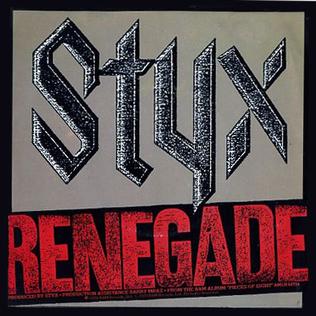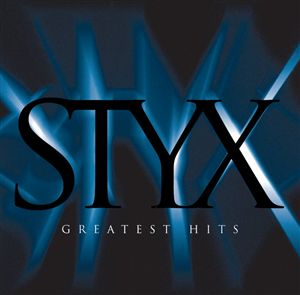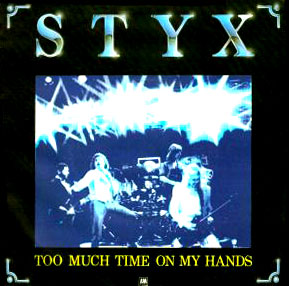Related Research Articles

Styx is an American rock band formed in Chicago, Illinois, in 1972. They are known for blending melodic hard rock guitar with acoustic guitar, synthesizers mixed with acoustic piano, upbeat tracks with power ballads, and incorporating elements of international musical theatre. The band established themselves with a progressive rock sound during the 1970s, and began to incorporate pop rock and soft rock elements in the 1980s.

Cyclorama is the fourteenth studio album by Styx, released in 2003. This was the first studio album with Lawrence Gowan, following the departure of group co-founder Dennis DeYoung in 1999. It was also the latter of two albums to feature Glen Burtnik, and the only album released by the Lawrence Gowan/Tommy Shaw/James "JY" Young/Glen Burtnik/Chuck Panozzo/Todd Sucherman lineup, and as such the only original Styx album to feature four different singer-songwriters as opposed to the usual three. The album peaked significantly higher on the Billboard album charts than Styx's previous release, Brave New World (1999), ending up 48 slots higher at No. 127, but paled in comparison to previous 1970s and 1980s releases on A&M Records.

Equinox is the fifth studio album by American rock band Styx, released in December 1975. The lead single "Lorelei" became Styx's second US Top 40 hit.
"Mr. Roboto" is a song by American rock band Styx, released as the lead single from their eleventh studio album, Kilroy Was Here (1983). It was written by band member Dennis DeYoung. In Canada, it went to #1 on the RPM national singles chart. It entered the US Billboard Hot 100 on 12 February 1983, reaching No. 3 in April.

Kilroy Was Here is the eleventh studio album by the American rock band Styx, released on February 22, 1983. A concept album and rock opera about a world where rock music is outlawed, it is named after a famous World War II graffiti tag, "Kilroy was here." It was the last album of original material to be released by the "classic" lineup of Dennis DeYoung, Tommy Shaw, James "J.Y." Young, John Panozzo, and Chuck Panozzo.

Caught in the Act is a live double album by Styx, released in 1984. It contains one new song, "Music Time," which was released as a single, reaching #40 on the Billboard Hot 100 charts.

Brave New World is the thirteenth studio album by Styx, released in 1999. It is the band’s first studio album to feature drummer Todd Sucherman, replacing John Panozzo, who died in 1996 and the last album to feature keyboardist/vocalist Dennis DeYoung. This is the last album that bassist Chuck Panozzo is credited as a full-time member, he would continue with the band as a part-time member. The album peaked at #175 on the Billboard 200 and reached the top 10 on the Top Internet Albums chart. However, its position on the Billboard charts was the lowest from a Styx album of new material since 1973's The Serpent Is Rising.

"Renegade" is a 1979 hit song recorded by the American rock band Styx on their Pieces of Eight album. Although songwriter Tommy Shaw and fellow Styx guitarist James Young usually played lead guitar on their own compositions, Shaw asked Young if he could take the solo on "Renegade". Young agreed, and Young later returned the favor by allowing Shaw to play lead on his "Half-Penny, Two-Penny" on the Paradise Theatre album. When performed live from 1978 to 1983, drummer John Panozzo increased the tempo of the drum pattern during the guitar solo sections. Also, the track would serve as the drum solo spot for Panozzo during that time frame.

"Lady" is a 1973 power ballad written and performed by the rock band Styx. It was first released on Styx II and was a local hit in the band's native Chicago, but initially failed to chart nationally. The song gained success shortly after Styx left Wooden Nickel Records to move to A&M Records in 1974 as it began picking up airplay nationwide, eventually peaking at #6 on the Billboard Hot 100 in March 1975. The power ballad was later re-recorded for the 1995 Styx compilation Greatest Hits due to a contractual dispute between A&M and Wooden Nickel.

Greatest Hits is a compilation album and primary Greatest Hits album by the American rock band Styx. It was released by A&M Records on August 22, 1995. It contains 16 tracks, 8 of which were Billboard Top 10 Pop Singles, another 4 that were Billboard Top 40 Pop Singles, and 4 that received heavy airplay on FM album oriented rock stations.

"Babe" is a song by the American rock band Styx. It was the lead single from the band's 1979 triple-platinum album Cornerstone. The song was Styx's first, and only, US number-one single, spending two weeks at No. 1 in December 1979, serving as the penultimate number-one single of the 1970s. "Babe" also went to No. 9 on the Adult Contemporary chart. It additionally held the number-one spot for six weeks on the Canadian RPM national singles chart, charting in December 1979 and becoming the opening chart-topper of the 1980s. It was also the band's only UK Top 40 hit, peaking at No. 6. It also reached No. 1 in South Africa.

"Don't Let It End" is the third track and the second top 10 single on the 1983 album Kilroy Was Here, by Styx. The song is also reprised at the end of the album.

"Blue Collar Man (Long Nights)" is a song by American rock band Styx, released as the first single from their eighth studio album, Pieces of Eight (1978). Released in 1978, the single came in two 7" vinyl formats: one with the b-side "Superstars" (a track from The Grand Illusion) and a second single with the instrumental album track "Aku-Aku" as the b-side. Some printings of the single were also issued in a translucent blue vinyl, which are now highly sought after collectors items.

"Sing for the Day'" is the second single that Styx released from their album Pieces of Eight. It reached #41 on the U.S. Billboard Hot 100 pop singles chart in February 1979. It was later the B-side of their next single “Renegade”. Tommy Shaw used the name ‘Hannah’ in the song, to represent his fans. Several years later, he named his newborn daughter Hannah. The album version that lasts 4:57, was edited down to 3:40 for the single version.

"Why Me" is a song written by Dennis DeYoung that was first released on Styx's 1979 double-platinum album Cornerstone. It was also released as the second single from the album, and reached #26 on the Billboard Hot 100 and #10 on the Canada RPM Top 100 Singles chart.

"Borrowed Time" is a song written by Dennis DeYoung and Tommy Shaw that was first released on Styx's 1979 album Cornerstone and was also released as the third single from Cornerstone. It peaked at No. 64 on the U.S. chart in April 1980.

"The Best of Times" is a song by American rock band Styx, released as the first single from their tenth album Paradise Theatre. It reached No. 1 in Canada on the RPM national singles chart, their second chart-topper in that country, and No. 3 on the US Billboard Hot 100 for four weeks in March and April 1981. In the UK, the song peaked at No. 42 on the UK Singles Chart.

"Too Much Time on My Hands" is a song by American rock band Styx, released as the second single from their tenth album Paradise Theatre. It was written and sung by Tommy Shaw, who also plays the lead guitar solo during the break in the song. It was Shaw's only top 10 single as a writer and vocalist with Styx.
"A.D. 1928 / Rockin' the Paradise" is a song by American rock band Styx, released as the fourth single from their tenth album Paradise Theatre. The song peaked at No. 8 on the Billboard Rock Chart. "A.D. 1928" is a short, piano-based song by Dennis DeYoung, set to the same melody as "The Best of Times", that segues into "Rockin' the Paradise". These two tracks would serve as the opening songs of not only the Paradise Theatre album but also its subsequent tour and the 1996 Return to Paradise reunion tour.
"Paradise" is the only single release from Styx's 1997 live double album Return to Paradise. The song was originally written and recorded by Dennis DeYoung for his musical The Hunchback of Notre Dame. The song was re-recorded by Styx for inclusion as one of three new studio tracks on the live album.
References
- ↑ "Styx singles".
- ↑ McPadden, Mike (September 16, 2015). "10 Hard Rock + Heavy Metal Artists That Went Glam for One Album". VH1. Archived from the original on October 8, 2022. Retrieved September 29, 2021.
- ↑ Whitaker, Sterling. The Grand Delusion: The Unauthorized True Story of Styx (2007) ISBN 1-4196-5353-9